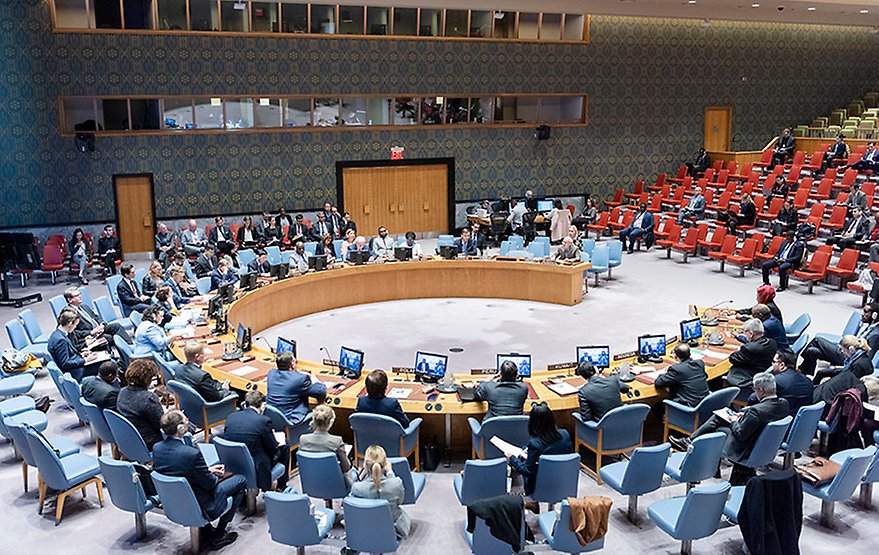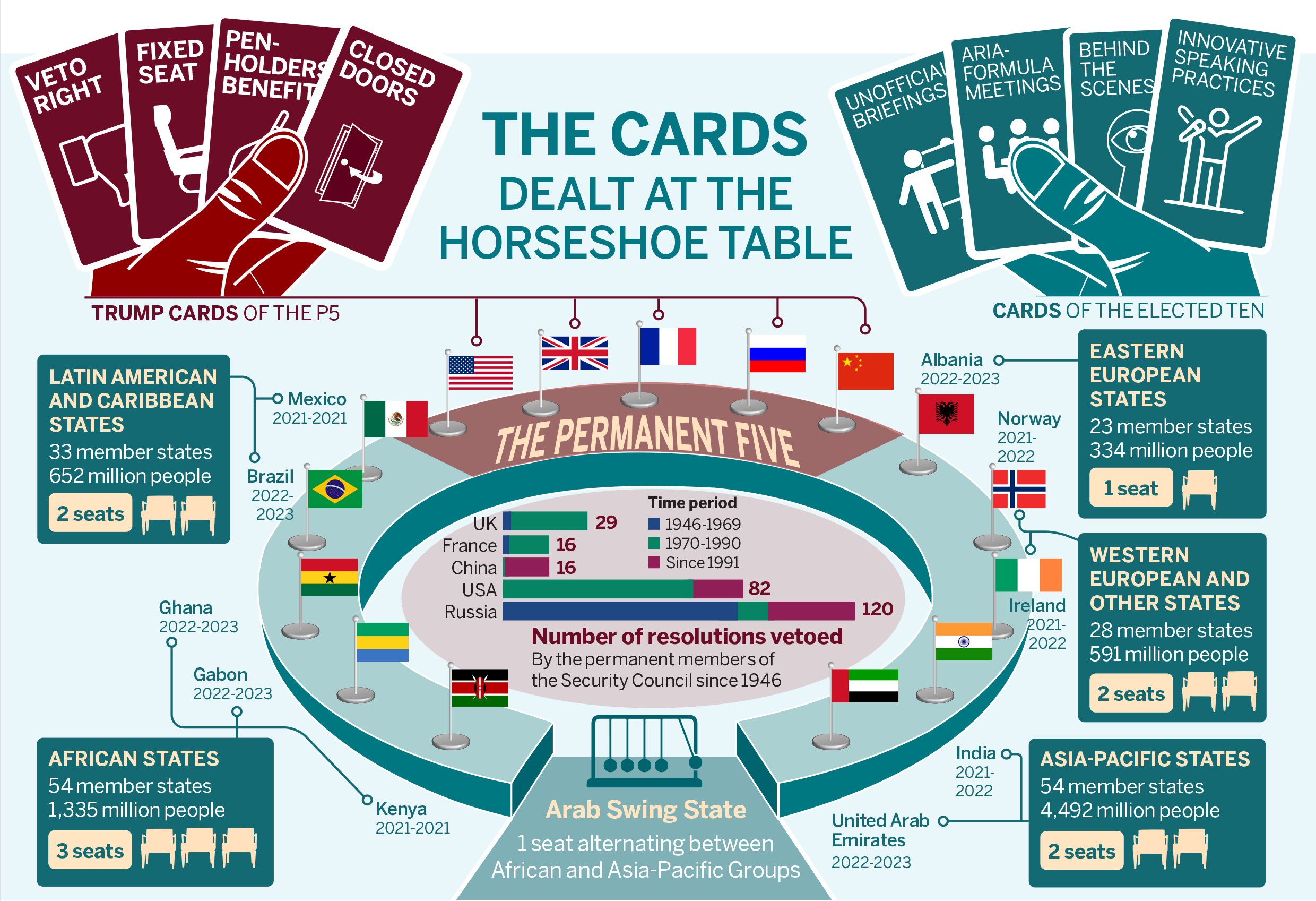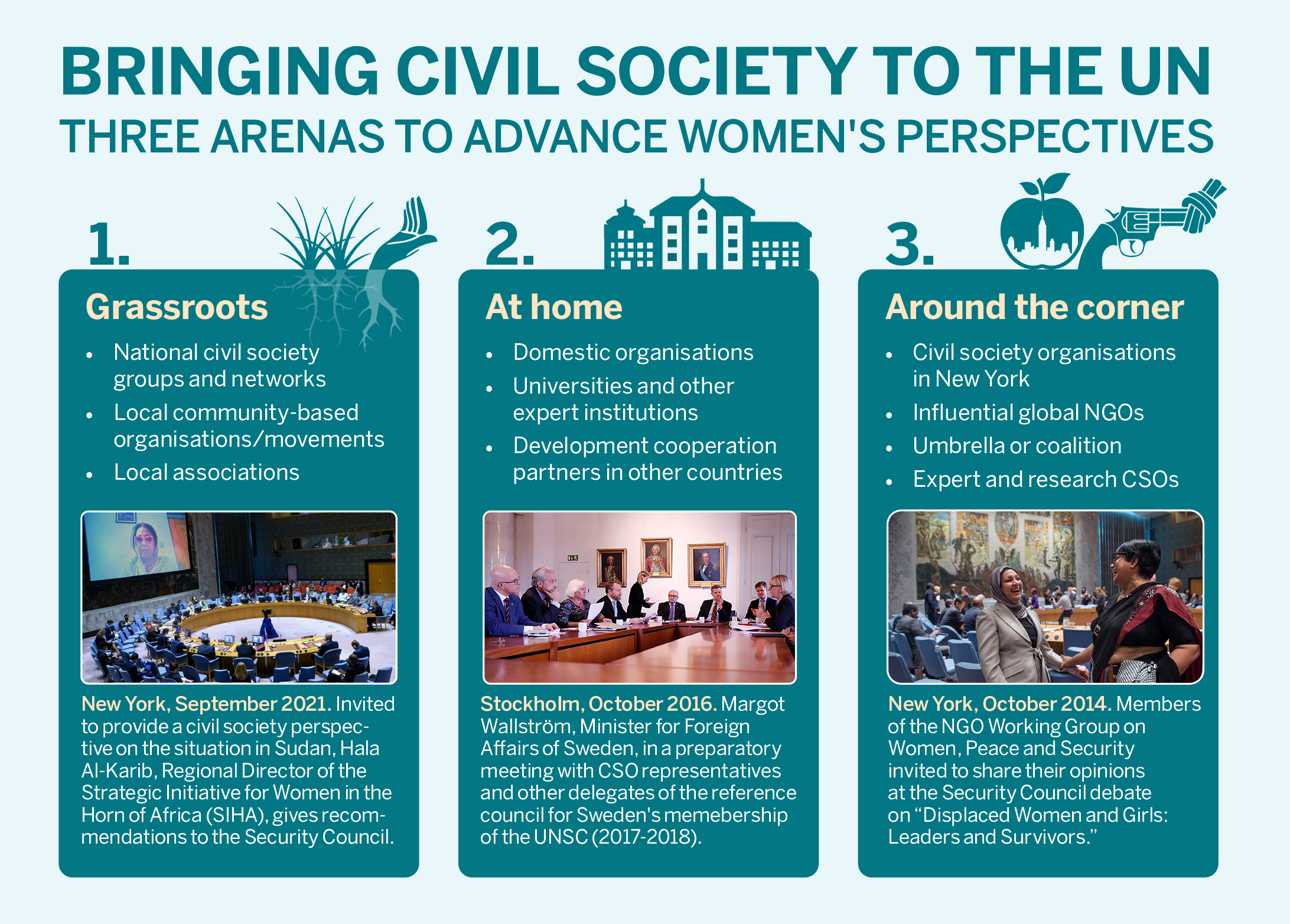Women, peace and security strategies at the horseshoe table
The elected ten UN Security Council members advancing the WPS agenda

UN Security Council holds meeting on Somalia, 21 November 2019. Photo Manuel Elias, UN.
The five permanent members (P5) of the UN Security Council have a lot of power – thanks largely to their right of veto, but also on account of other advantages. To curb the imbalance in power and strengthen their position, the ten elected (E10), non-permanent members should collaborate more and share their experiences – both among themselves and with the next group of E10 states waiting to replace them. One of the best means of gaining influence is to work with civil society. There are different ways of doing this, and many have shown themselves to be constructive in advancing the agenda for women, peace and security (WPS).

By Jim Jormanainen, Tina Kurath and Angela Muvumba Sellström
The UN Charter gives the UN Security Council (UNSC) primary responsibility for taking prompt and effective action to protect international peace and security. A UNSC decision needs nine affirmative votes – with no negative votes from the P5 – to be legitimate and to enter into force. All UN members are obliged to accept and carry out Council decisions. The Council is frequently criticized for being hostage to the geopolitical competition between its P5 members (particularly China, Russia and the US), and for being unresponsive to the needs of people in conflict situations. It appears ever harder to justify having a privileged P5, which together represent only 26 per cent of the world’s population. Their veto powers are based on their victory at the end of World War II, over 76 years ago; but since then, the world has changed significantly.
New research suggests that E10 states accomplish more in the Council than was previously thought. They utilize formal and informal mechanisms creatively to advance their membership objectives. They leverage their committee tasks and delegated authority, and gather and exchange information both among themselves and through regional groups, such as the African Union and the European Union. They rely on vast and diverse networks, and often actively involve civil society in these mechanisms.
The landmark Security Council Resolution 1325 is the result of action taken by an E10 state, Namibia (member 1999–2000), which convened the first open debate on WPS during its presidency of the Council. That resolution evolved into the WPS agenda, which to date consists of ten more resolutions on a host of issues that affect women’s experiences in conflict and their role in securing peace. Additionally, two further resolutions on peacekeeping have been adopted: these align with the WPS agenda on women in peacekeeping and the problem of sexual exploitation and abuse. The resolutions constitute a type of legislative framework that makes it possible to integrate gender-equality principles and concerns for women’s rights into the UNSC’s other resolutions and decisions. Significantly, the WPS agenda is the result of feminist and women’s civil society organizations that have lobbied the UNSC, its members and the UN secretariat to deepen its actions on the gendered effects of conflict and on the need to promote women’s meaningful participation in peacemaking, peacekeeping and peacebuilding.
How to gain a seat at the horseshoe table
The UN General Assembly, which consists of all 193 members of the UN, elects ten countries on a rotating basis, normally for a term of two years. Elections are held by secret ballot each year in June, and five non-permanent members are given a seat at the famous horseshoe-shaped table in the UN Security Council chamber. The criterion of equitable geographical distribution has, in practice, resulted in a system of five regional electoral groups, each entitled to a limited number of seats. For example, the African Group holds three seats (the A3). Two positions are available in odd years and one in even years. Countries notify the monthly rotating head of the electoral group of their intention to stand for election, and then begin to gather vote pledges from other members. The campaign process is increasingly competitive and time intensive.
Serving elected members are motivated to demonstrate their efficacy in the Council. A lacklustre performance, without visible results, or a failure to represent regional interests might undermine a state’s legitimacy in the UN system. For some states, such as Nigeria, which over the years has been elected for five terms, being at the horseshoe table is part of its self-perception as a regional leader, almost a ‘permanent-member-in-waiting’. Its election is therefore also a matter of reaffirming its leadership status.
New means of influence for the E10
To fulfil the promises they make, E10 states do have certain formal and informal mechanisms at their disposal. Formal mechanisms consist of Council meetings, consultations, the rotating monthly presidency, field visits and committee-chairing roles in the official working agenda. There is also the ‘penholder’ system, where a Council member leads the formal activities on a Council agenda item. However, the P5 dominate this mechanism. For example, the UK is the penholder for WPS, which means that, among other formal activities, it controls negotiations, the drafting of texts and the convening of meetings. The US ‘holds the pen’ on conflict-related sexual violence. In addition, the P5 can, behind closed doors, block proposals by threatening to use their veto. This P5 dominance means that the E10 states have limited opportunities to introduce new ideas or to take up sensitive issues that run counter to P5 preferences. As a result, E10 states have learned to exercise their influence in other ways.
“I believe that opening up [Council meetings] has made them more democratic. Imagine how differently the Yugoslavian war [would have been] if we had been able to hear more outside players.”
Diego Arria, initiator of the Arria-Formula Meetings, PassBlue, Interview 17 August 2021.
Informal mechanisms include unofficial briefings, innovations in speaking practices, and behind-the-scenes discussions with members and UN staff. Then there are the Arria-formula meetings. Any UNSC member can call an informal Arria-formula meeting with actors outside the Council, such as high-level delegations from non-UNSC states or civil society organizations. The first meeting, as the name indicates, was called by Diego Arria, Venezuela's ambassador to the UN, in 1996, when he invited a Croation priest to talk about the Balkans. Informality enables unofficial negotiation and information sharing. Both P5 and E10 members rely on informal means – albeit to differing extents. According to a report External link, opens in new window. from the independent not-for-profit organisation Security Council Report (SCR), the use of Arria-formula meetings has increased in recent years. In fact, this is rather a worrying trend, since the meetings were initially designed so that any member could discuss sensitive matters that would not be likely to make it onto the Council's formal work agenda. So the trend suggests that inaction may be deepening within the UNSC, and that its members may increasingly prefer to address matters outside the formal mechanisms.
External link, opens in new window. from the independent not-for-profit organisation Security Council Report (SCR), the use of Arria-formula meetings has increased in recent years. In fact, this is rather a worrying trend, since the meetings were initially designed so that any member could discuss sensitive matters that would not be likely to make it onto the Council's formal work agenda. So the trend suggests that inaction may be deepening within the UNSC, and that its members may increasingly prefer to address matters outside the formal mechanisms.

Bringing civil society to the Council
Feminist and women’s civil society organizations (CSOs) have been influential in advancing the WPS agenda. Many E10 countries have championed the move to bring civil society to the Council as a way of ensuring that women’s perspectives form part of the UNSC’s deliberations and decision making. Spain (member 2015–16) promoted the use of female briefers from CSOs in conflict-affected situations in the Council, an idea that Sweden (2017–18) continued and developed. A civil society briefer is a member of civil society who addresses the Council to provide insight into a local perspective or to raise awareness of an issue. Sweden not only worked with civil society close to the UN headquarters in New York, but also engaged with national civil society in Stockholm. The Swedish approach was new, in that it was structured, planned and continued throughout its term. Ghana (2022–23) has now also taken up this approach.
“Madam President, this is Sudan today – where women wonder if they are better off than they were under al-Bashir’s oppressive regime. I would like to highlight three areas for the Security Council that must be urgently addressed.”
Hala Al-Karib, Regional Director of SIHA.
For strategists in the UN delegations of the E10 countries who want to make use of the experiences, knowledge, skills, energy and networks of the CSOs, it is helpful to understand how they operate and engage in WPS issues. There are three different arenas, which may overlap and intermingle: at the ‘grassroots’, at ‘home’ and ‘around the corner’.
Civil society at the grassroots
At the grassroots level, CSOs work directly with conflict-affected communities and have local expertise. They can access local knowledge, have insight into conflict dynamics, and know the needs of local communities. They carry out advocacy, engage in raising awareness, and administer national and local initiatives. They gather evidence and data – from gender-disaggregated information to incident reports and evaluations.
The practice of bringing CSOs to brief the UNSC has meant that more women’s voices have been heard in the Council’s chamber. One grassroots organization that directly influenced the Council in 2021 was the Strategic Initiative for Women in the Horn of Africa (SIHA). Its regional director, Hala Al-Karib, was invited through the non-governmental organization (NGO) Working Group on Women, Peace and Security to brief the UNSC on the situation in Sudan. During the discussions, SIHA provided the UNSC with recommendations and a grassroots perspective, and described the situation of women on the ground.

Civil society at home
Civil society ‘at home’ operates at the national level, and E10 governments may turn to these organizations for various reasons. They may be in the vanguard of national women’s and feminist movements and have influence in society. They offer particular research expertise that can be beneficial to the E10’s Security Council membership. Governments can engage with CSOs at home either on a one-to-one basis or through collective arrangements, such as reference groups. Their main activities are advising the government, conducting research and helping to set and track the agenda.
“During our time in the Security Council, more civil society briefers than ever were invited which have resulted in more inclusive and better-informed discussions.”
Ann Linde, Minister for Foreign Affairs, Sweden.
During its most recent membership of the UNSC (2017–18), Sweden established a Reference Council consisting of 16 organizations. It included a diverse range of actors, from advocacy groups to experts and research institutions, covering a wide range of topics. In addition to these 16 organizations, the Swedish Foreign Ministry regularly liaised with 30-40 NGOs, to share information and receive feedback. Sweden also liaised through embassies with civil society in foreign countries whenever it needed country-specific information, for example in the preparation of a UNSC briefing on peacebuilding and democracy in Liberia a few months before that country’s 2017 general election.
Civil society around the corner
The third group, CSOs ‘around the corner’, are significantly closer to the UNSC. These actors are based in New York and include think tanks, university research institutions and umbrella organizations. Other key actors are NGOs such as the Red Cross, Human Rights Watch and Amnesty International. They provide expert advice, share extensive networks and provide platforms for debate and deliberation, and can influence processes behind closed doors. They have been involved in UN policy matters for decades, often shaping international debates. Indeed, many UN officials have worked in this particular CSO sector. On WPS, they play an important bridging role, by identifying policy gaps, bringing together frontline research, establishing special WPS-related projects, and providing expert documentation and analysis.
“But we cannot forget that it was the relentless leadership of civil society activists, veterans of the struggle for peace, that ensured the adoption of that very resolution [Res 1325] 15 years ago.”
Alaa Murabit, woman briefer from Libya in the UNSC meeting that leads to the adoption of resolution 2242 which decided to invit[ing] civil society, including women’s organisations, to brief the council in country-specific considerations and relevant thematic areas (2015).
The NGO Working Group on Women, Peace and Security is an example of a New York-based CSO that has had a direct impact on UNSC processes. As the umbrella organization for 18 CSOs, it carries out in-person briefings, addresses UN events and distributes monthly action points. The Working Group also calls on CSO partners around the world to build a bridge between grassroots civil society and the New York-based UN policy community. It facilitates the civil society statements given each year in the UNSC’s open debates on women, peace and security and sexual violence in conflict, and works with UN Women and the rotating presidency of the Council to ensure that women’s organizations are invited to give briefings on country situations.
Policy recommendations
The elected ten (E10) members of the UN Security Council should continue to shore up civil society collaboration.
- E10 states should build relationships with each other, and with civil society organizations in conflict situations, within their national context and around the UN community in New York. This will expand their access to knowledge, expertise and information.
- E10 knowledge and capacity should be developed over time. Incoming, sitting and exiting states should organize joint activities and build on one another’s lessons and achievements.
- The insights from civil society exchanges should be shared with the P5 and the members of the General Assembly. This would foster greater transparency and increase the likelihood of dialogue.
These recommendations will also depend on the political will and capacity of E10 states, and on whether or not they take proactive steps toward collaboration. If they do, the E10 will increase its ability to navigate the UNSC and bring new solutions to resolving and managing conflict.
NAI Policy Notes is a series of research-based briefs on relevant topics, intended for strategists, analysts and decision makers in foreign policy, aid and development. They aim to inform public debate and generate input into the sphere of policymaking. The opinions expressed are those of the authors and do not necessarily reflect the views of the Institute.
About the authors
- Jim Jormanainen, research assistant at the Nordic Africa Institute, specialised in Women, Peace and Security (WPS) and gender-based violence.
- Tina Kurath, student at Uppsala University, Department of Peace and Conflict Research, and intern at the Nordic Africa Institute, specialised in African Peace and Security Architecture (APSA).
- Angela Muvumba Sellström, senior researcher with expertise on WPS; the UN Security Council and the role of the elected ten members.
Further reading
The NAI policy notes series is based on academic research. For further reading on this topic, we recommend the following titles:
- Louise Olsson (2021): What Do We Know About State-Civil Society Engagement for Women, Peace and Security in the UN Security Council?
 External link, opens in new window. PRIO Blog Post.
External link, opens in new window. PRIO Blog Post. - Patty Chang, Louise Olsson, Angela Muvumba Sellström (2021): Advancing Women, Peace and Security in the UN Security Council: Critical Choices for Elected Member States
 External link, opens in new window., IPI Global Observatory, and NAI Blog.
External link, opens in new window., IPI Global Observatory, and NAI Blog. - Louise Olsson, Patty Chang, Torunn L. Tryggestad & Peter Wallensteen (2021): Sweden as an Elected Member of the UN Security Council: Promoting Women, Peace and Security as Core Council Business, 2017–18,
 External link, opens in new window. PRIO Paper. Oslo: PRIO.
External link, opens in new window. PRIO Paper. Oslo: PRIO. - Niels Schia (2017): Horseshoe and Catwalk: Power, Complexity, and Consensus-Making in the United Nations Security Council.
 External link, opens in new window. In R. Niezen and M. Sapignoli (Eds.), Palaces of Hope: The Anthropology of Global Organizations Cambridge: Cambridge University Press, pp. 55-77.
External link, opens in new window. In R. Niezen and M. Sapignoli (Eds.), Palaces of Hope: The Anthropology of Global Organizations Cambridge: Cambridge University Press, pp. 55-77.
How to refer to this policy note:
Jormanainen, Jim; Kurath, Tina and Muvumba Sellström, Angela, 2022, Women, peace and security strategies at the horseshoe table: The elected ten UN Security Council members advancing the WPS agenda, NAI Policy Notes 2022:3, Uppsala: The Nordic Africa Institute. http://urn.kb.se/resolve?urn=urn:nbn:se:nai:diva-2661 External link.
External link.
